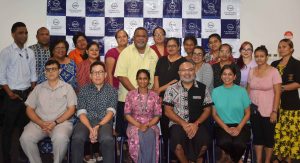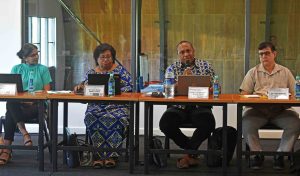

Representatives from FNU’s College of Medicine, Nursing and Health Sciences (CMNHS), the Ministry of Health and Medical Services, and The George Institute for Global Health (TGIGH), University of New South Wales in Sydney, Australia that were part of the workshop to evaluate the implementation of the World Health Organisation’s Package of Essential Non-Communicable (PEN) Disease Interventions for primary health care.
The Fiji National University (FNU) in collaboration with local and regional partners organised a workshop as part of an evaluation study, to evaluate the implementation of the World Health Organisation’s Package of Essential Non-Communicable (PEN) Disease Interventions for primary health care.
The workshop was attended by representatives from FNU’s College of Medicine, Nursing and Health Sciences (CMNHS), the Ministry of Health and Medical Services and was facilitated by primary investigators of the study, Professor Stephen Jan and Dr Bindu Patel of The George Institute for Global Health (TGIGH), University of New South Wales in Sydney, Australia.
Held at the Sports and Wellness Centre at the FNU Nasinu Campus, the workshop enabled medical practitioners to respond to questions and contribute to discussions facilitated by the research group (which comprised of partners from TGIGH, CMNHS and the MoHMS), to discuss the effectiveness of the PEN program and map strategies to help improve its implementation in the country.
The WHO PEN Program is a prioritised set of a cost-effective comprehensive package of clinical services for diabetics and hypertensives.
The aim of PEN was to set a minimum standard for the management of Non-Communicable Diseases (NCDs) integrated within primary care to prevent, detect, treat, and manage people with a high risk of NCDs.
It consists of lifestyle counselling, monitoring and control of blood pressure and blood glucose, treatment with essential NCD medication, and proactive prevention and management of complications.
The FNU had included the PEN standards in specific programmes in 2021, to ensure graduates were well versed with the PEN model when joining the workforce. The University also runs the Postgraduate Diploma in NCD’s and Master of Public Health in NCDs programmes to assist in national efforts of addressing the NCDs epidemic in the country.
CMNHS Acting Dean Dr Donald Wilson said as an academic institution, FNU was happy to be part of the project.
“I think as an academic institution we need to contribute to that space of evidence,” he said.

FNU’s Assistant Professor – Primary Care, School of Public Health, College of Medicine, Nursing and Health Sciences (CMNHS), Dr Filimoni Raikanikoda raised a point during World Health Organisation’s Package of Essential Non-Communicable (PEN) Disease Interventions for primary health care evaluation workshop.
“The school of Public Health, in particular, teach the students about the PEN model and I think it is important that this is evidence-based.”
CMNHS Head of Pacific Research Centre for the Prevention of Obesity and Non-Communicable Diseases (C-POND) Dr Gade Waqa said while a lot of research has been conducted, the greater challenge lies in disseminating the studies to policymakers.
“Studies have confirmed that 80% of all deaths in Fiji are related to NCDs of which 34% are attributed to cardiovascular disease and 22% with diabetes mellitus,” she said.
The PEN program was piloted in Suva Fiji in late 2012 before being rolled out to the rest of the division, and an evaluation is overdue.”
“We hope that research will provide Fiji MHMS and its multidisciplinary partners with data and sound evidence to assist policymakers with policy decisions enabling intended outcomes (reduced NCD mortality and morbidity).”
PEN implementation in Fiji commenced in 2012 with the country applying Protocol 1 – Integrated management of Diabetes and Hypertension and Protocol 2 – health Education and Counselling on Healthy Behaviours in Special Outpatient Departments.